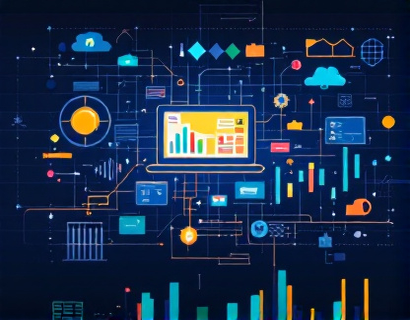Transforming Digital Productivity: The Synergy of AI and Crypto
The digital age has ushered in a revolution in productivity, driven by the convergence of artificial intelligence and cryptocurrency. This fusion of technologies is not just a trend but a transformative force reshaping how we work, interact, and manage tasks. By leveraging the strengths of both AI and crypto, we are witnessing the emergence of innovative solutions that streamline processes, enhance efficiency, and open new avenues for innovation.
The integration of AI and crypto is creating a new paradigm in digital productivity. AI, with its capabilities in data analysis, pattern recognition, and automated decision-making, is becoming an indispensable tool in various industries. Meanwhile, cryptocurrency, with its decentralized and secure nature, is redefining financial transactions and data management. When combined, these technologies offer a powerful toolkit for optimizing productivity in the digital landscape.
Enhanced Data Management and Security
One of the key areas where AI and crypto intersect is in data management and security. AI algorithms can process and analyze vast amounts of data to identify patterns, predict trends, and make informed decisions. This is particularly valuable in industries dealing with large datasets, such as finance, healthcare, and e-commerce. However, the security of this data is paramount, and this is where cryptocurrency plays a crucial role.
Cryptocurrency's inherent security features, such as blockchain technology, provide a robust framework for protecting sensitive information. Blockchain's decentralized and immutable ledger ensures that data transactions are transparent, secure, and tamper-proof. By integrating AI with blockchain, organizations can automate data verification and security checks, reducing the risk of breaches and ensuring compliance with regulatory standards.
Automated Task Execution and Smart Contracts
AI-driven automation combined with smart contracts is revolutionizing the way tasks are executed and managed. Smart contracts, self-enforcing contracts with the terms directly written into code, can be triggered by specific conditions detected by AI systems. This synergy allows for the creation of automated workflows that are not only efficient but also highly reliable.
For instance, in supply chain management, AI can monitor inventory levels, predict demand, and optimize logistics. When these AI-driven insights are integrated with smart contracts, the system can automatically execute transactions, such as payments or inventory adjustments, without the need for intermediaries. This not only speeds up processes but also reduces costs and minimizes human error.
Intelligent Financial Management
The financial sector is another area where the combination of AI and crypto is driving significant advancements. AI algorithms can analyze market data, identify trends, and make predictive forecasts, providing valuable insights for investors and financial institutions. Cryptocurrency, with its real-time transaction capabilities and low fees, serves as an efficient medium for executing these trades and managing assets.
Robo-advisors, powered by AI, can create and manage customized investment portfolios based on individual risk profiles and financial goals. When these platforms accept and process transactions in cryptocurrency, they offer a seamless and secure experience, free from the traditional banking system's constraints. This fusion enhances liquidity, reduces transaction costs, and provides greater financial flexibility.
Enhanced User Experiences through Personalization
AI and crypto are also transforming user experiences by enabling highly personalized and secure interactions. AI-driven recommendation systems can analyze user behavior and preferences to suggest relevant products, services, and content. This level of personalization not only improves user satisfaction but also drives engagement and loyalty.
Cryptocurrency adds an extra layer of security to these personalized experiences. By using crypto-based identity verification and authentication methods, platforms can ensure that user data is protected and that interactions are secure. This is particularly important in industries handling sensitive information, such as healthcare and finance, where data privacy is a top priority.
Decentralized Applications and Ecosystems
The rise of decentralized applications (dApps) is a testament to the potential of AI and crypto in creating innovative digital ecosystems. dApps leverage blockchain technology to operate on decentralized networks, eliminating the need for central authorities. AI can enhance these applications by providing intelligent functionalities, such as automated moderation, predictive analytics, and optimized resource allocation.
For example, in the realm of social media, a decentralized platform can use AI to curate content based on user preferences while ensuring that the network remains secure and free from malicious activities. Cryptocurrency can facilitate transactions within the ecosystem, rewarding users for contributions and ensuring a fair and transparent system.
Challenges and Considerations
While the integration of AI and crypto offers numerous benefits, it also presents challenges that need to be addressed. One of the primary concerns is the regulatory landscape. As both AI and cryptocurrency continue to evolve, regulatory frameworks are still catching up. Organizations must navigate these regulations carefully to ensure compliance and avoid legal pitfalls.
Another challenge is the technical complexity involved in integrating these technologies. Developing robust systems that seamlessly combine AI and crypto requires expertise in multiple domains. Collaboration between AI specialists, blockchain developers, and industry experts is essential to overcome these technical hurdles.
Future Prospects and Innovations
Looking ahead, the potential for AI and crypto to transform digital productivity is vast. Emerging technologies such as quantum computing and advanced machine learning algorithms will further enhance the capabilities of AI, making it even more powerful and efficient. Meanwhile, the evolution of blockchain, including layer 2 solutions and interoperability protocols, will make cryptocurrency transactions faster and more scalable.
The convergence of these technologies is likely to give rise to new applications and services that we can only begin to imagine. From smart cities leveraging AI and blockchain for efficient resource management to decentralized healthcare systems ensuring data privacy and security, the possibilities are endless.
In conclusion, the synergy between AI and crypto is not just a technological trend but a fundamental shift in how we approach digital productivity. By embracing this integration, organizations and individuals can unlock new levels of efficiency, security, and innovation, paving the way for a more connected and intelligent future.




